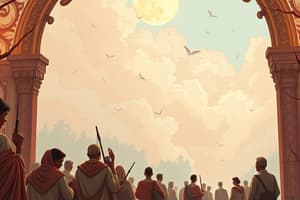Podcast
Questions and Answers
What was the primary goal of promoting mother tongues according to the provided content?
What was the primary goal of promoting mother tongues according to the provided content?
- To establish a single global language
- To eliminate linguistic diversity
- To preserve cultural and linguistic heritage (correct)
- To promote only modern languages
Which date was proclaimed as International Mother Language Day by UNESCO?
Which date was proclaimed as International Mother Language Day by UNESCO?
- 21 February (correct)
- 5 March
- 17 November
- 1 January
Who was involved in shepherding the proposal for International Mother Language Day through UNESCO's system?
Who was involved in shepherding the proposal for International Mother Language Day through UNESCO's system?
- Rafiqul Islam and Sheikh Hasina
- Syed Muazzem Ali and Rafiqul Islam
- Federico Mayor and Sheikh Hasina
- Tozammel Tony Huq and Syed Muazzem Ali (correct)
What underlying principle does promoting mother tongues aim to inspire?
What underlying principle does promoting mother tongues aim to inspire?
What significant event does International Mother Language Day commemorate?
What significant event does International Mother Language Day commemorate?
What event did the police respond to with violence on 21 February 1952?
What event did the police respond to with violence on 21 February 1952?
What was declared by UNESCO on 17 November 1999 in honor of the Bengali language movement?
What was declared by UNESCO on 17 November 1999 in honor of the Bengali language movement?
Who first raised the demand for Bangla to be recognized as a national language?
Who first raised the demand for Bangla to be recognized as a national language?
What monument do Bangladeshis visit to honor the martyrs of the language movement?
What monument do Bangladeshis visit to honor the martyrs of the language movement?
Which two individuals suggested the resolution for International Mother Language Day?
Which two individuals suggested the resolution for International Mother Language Day?
Flashcards are hidden until you start studying
Study Notes
Bengali Language Movement
-
Date of Procession: A significant march occurred on 21 February 1952 in Dhaka, highlighting the struggle for language rights.
-
International Recognition: UNESCO declared 21 February as International Mother Language Day on 17 November 1999, which has been observed worldwide since 2000.
-
Historical Background: After the creation of Pakistan in 1947, it consisted of East Pakistan (now Bangladesh) and West Pakistan (now Pakistan), which were culturally and linguistically distinct.
-
Language Policy Issue: In 1948, the Pakistani government proclaimed Urdu as the sole national language despite Bengali being the mother tongue of the majority in East Pakistan, leading to widespread protests.
-
Initial Protest Demand: Dhirendranath Datta first raised the call for Bengali to be recognized as a national language in the Pakistan Constituent Assembly on 23 February 1948.
-
Government Response: To suppress protests, the Pakistani government banned public gatherings, igniting larger demonstrations from students at the University of Dhaka and the general populace.
-
Tragic Incident: On 21 February 1952, police opened fire on protesting students, resulting in the deaths of Abdus Salam, Abul Barkat, Rafiq Uddin Ahmed, Abdul Jabbar, and Shafiur Rahman, with many others injured.
-
Commemoration: The day is observed with visits to Shaheed Minar, a memorial for the martyrs, symbolizing deep sorrow and respect for those who sacrificed their lives.
International Mother Language Day
-
National Holiday: International Mother Language Day is a national holiday in Bangladesh commemorating the Language Movement.
-
Advocacy for Global Language Awareness: The day promotes the preservation of linguistic diversity and heritage, emphasizing the importance of mother tongues in cultural continuity.
-
Proposal Initiation: Rafiqul Islam and Abdus Salam, Bengalis living in Canada, proposed the establishment of the day in a letter to Kofi Annan on 9 January 1998.
-
Significance of the Date: The date of 21 February was chosen to honor those who lost their lives during the 1952 protests.
-
Formal Adoption: The Government of Bangladesh submitted the proposal through diplomatic channels, spearheaded by Syed Muazzem Ali and Tozammel Tony Huq.
-
UNESCO Resolution: On 17 November 1999, UNESCO’s 30th General Assembly unanimously proclaimed 21 February as International Mother Language Day, honoring the martyrs' sacrifice.
Studying That Suits You
Use AI to generate personalized quizzes and flashcards to suit your learning preferences.




